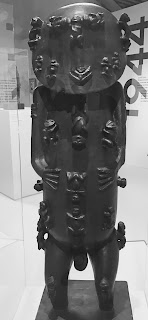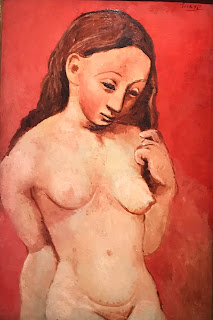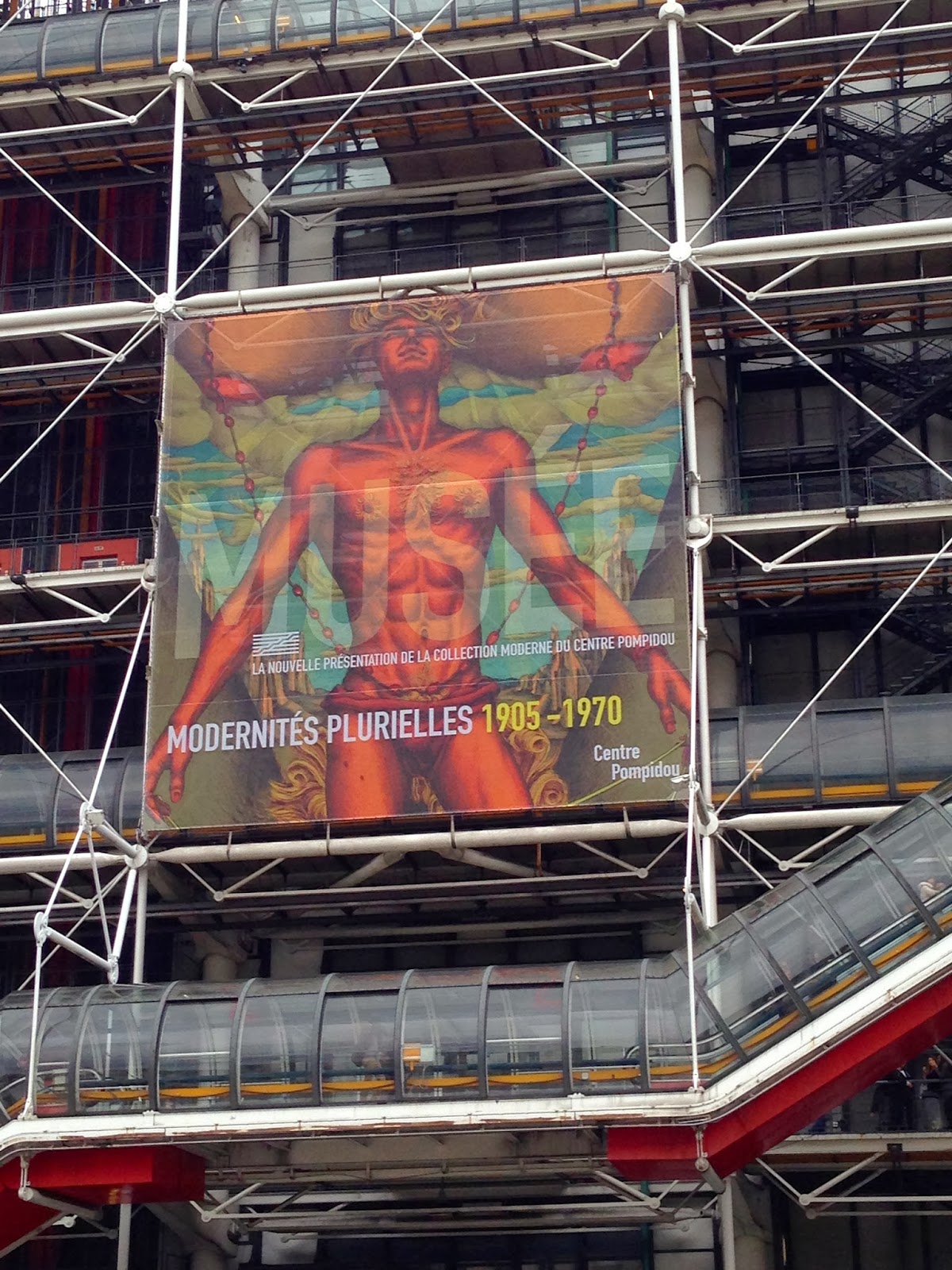THERE IT WAS, THE ANSWER AT LAST...
When I was making out my list of exhibitions to see, not forgetting those around Europe, I asked myself but why is it « Picassomania» year? There seem to be exhibitions all over the place and before the end of the year in France there will be five - maybe more. It’s not a celebration year. (188l-1973). Could it have something to do with Olga? His Russian wife as they married in 1917? There is an exhibition on their relationship as well. That will be my next chapter. After a little hunting around I discovered that Bernard-Ruiz Picasso (grandson of Olga and Picasso) who is the joint co-curator of the Parisian museum is now much more lenient about works being shipped and shown in other museums - around the world. As this was not the previous strategy it could mean that more and more museums are able to put on blockbuster exhibitions. We must remember that there are over 5000 works of Picasso in the Parisian archives alone. Overtime, wherever I have been I always seem to discover another Picasso.
But there it was. Staring me in the face. I am not overly keen on tribal artifacts, masks etc. The Quai Branly museum (renamed Quai Branly Jacques Chirac) is not a regular port of call unless there are temporary exhibitions which look as if they may interest me. « Picasso Primitif » did. The exhibition in question opens with a chronological discovery of Picasso’s relationship with non-western art, from 1900 when he moved to Paris, until 1974, one year after his death.
When did Picasso first encounter « primitive arts »? The exhibitions he may have seen? What did he collect? What was the relationship with his own creative works? His interest was not only African art, but extended to many other cultures.
I have always been slightly surprised by this passion for « Primitive » art. Just not curious enough though to delve into the reason why. Now I would. There it was staring at me in the face. These artifacts were friends who accompanied Picasso wherever he went. The curator assures us that he was not inspired by such work, but it it was always there. Sitting next to him, on a wall, on a shelf…A permanent presence in his many studios. Creations from all over the world. An exchange - a dialogue with them born of admiration, respect and fear.
Why fear?
He said in one interview that Braque enjoyed such work and was never afraid of it. Picasso was, so he said. In fact very afraid when he first visited the Museum at the Trocadero alone and saw such work for the first time? « I was alone and afraid ».
Out of that encounter came « Les Demoiselles d’Avignon ».
From then on, we discover these works are there in everything his does, right throughout his life. He said it himself.
There was also a sculpture that Matisse wanted to give him. Nevimbumbao from Vanuatu. However, Picasso refused this gift for a number of years. He said
Picasso also becomes a work of art...
He was not the only painter of this period to take the same interest in such art.
His interest in archetypal and early forms led him to explore different body forms in his own work. There is nothing about them which can be associated with what we know and accept but the body is drastically changed. No longer figurative or even abstract but sometimes very basic and we have to look twice to see the form emerging from the canvass.
Then there is this metamorphosis. He changes his forms again and seems to increase the angles in his sculptures.
Or these sculptures which make us smile and yet here again there is the dialogue between the different art forms.
Now I see his nudes in another light.
Suddenly everything seems to become « formless ». Disfigured and mask-like forms. Hybrid and ambivalent figures. Picasso twist faces and bodies as if they were magic entities. Some are so erotic which here again can be associated with this dialogue between the Non-Western and Western art. There even seems to be a fusion between animal and human. Life and death?
Looking at the galleries from a little way off, I sometimes wondered which was Picasso and which was primitive art? I wonder if you have felt the same thing as we discovered these works?
It’s an amazing discovery. The influences, the relationships, a human dialogue with other worlds. From now on, I will be looking at "primitive" art with a "Picasso eye" !
But there it was. Staring me in the face. I am not overly keen on tribal artifacts, masks etc. The Quai Branly museum (renamed Quai Branly Jacques Chirac) is not a regular port of call unless there are temporary exhibitions which look as if they may interest me. « Picasso Primitif » did. The exhibition in question opens with a chronological discovery of Picasso’s relationship with non-western art, from 1900 when he moved to Paris, until 1974, one year after his death.
 |
| Picasso in his studio, the Bateau-Lavoir:1908 |
 |
| Picasso with Gilot (?) |
 | |||
| Picasso with top model Bettina Graziani phtographe for Life - 1955 |
 |
| Picasso with the Iles Marquises Statue The Tiki God - 1955 |
When did Picasso first encounter « primitive arts »? The exhibitions he may have seen? What did he collect? What was the relationship with his own creative works? His interest was not only African art, but extended to many other cultures.
 |
| Bronze "Baoulé"mask |
 |
| Anonymous -Iberian |
 |
| Okuyi Mask |
 |
| Ivory Coast - Krou |
 |
| Nimba - Guinee end 19thC |
 |
| Détroit de Tores - 19thC; |
 |
| d'A'a Figure 17th C |
 |
| Krou Mask Ivory Coast |
 |
| Male and Female Figures Baoulé (?) |
I have always been slightly surprised by this passion for « Primitive » art. Just not curious enough though to delve into the reason why. Now I would. There it was staring at me in the face. These artifacts were friends who accompanied Picasso wherever he went. The curator assures us that he was not inspired by such work, but it it was always there. Sitting next to him, on a wall, on a shelf…A permanent presence in his many studios. Creations from all over the world. An exchange - a dialogue with them born of admiration, respect and fear.
 |
| Afyer Picasso's death in 1973, this unknown collection was discovered. |
 |
| With Brigitte Bardot during the Cannes Festival in 195 |
Why fear?
He said in one interview that Braque enjoyed such work and was never afraid of it. Picasso was, so he said. In fact very afraid when he first visited the Museum at the Trocadero alone and saw such work for the first time? « I was alone and afraid ».
Out of that encounter came « Les Demoiselles d’Avignon ».
 |
| 1906-1907 |
From then on, we discover these works are there in everything his does, right throughout his life. He said it himself.
« It was when I saw them that I understood the sense of painting. It’s not an esthetic process. It’s a form of magic that interposes between the hostile universe and ours, a way of seizing power, reinforcing a form which is part of fear and desire. The day I understood that, I knew that I had found my way » (a quote from Francoise Gilot’s book, « Living with Picasso 1964).
There was also a sculpture that Matisse wanted to give him. Nevimbumbao from Vanuatu. However, Picasso refused this gift for a number of years. He said
« This thing from New Guinea makes me scared. I’m sure Matisse feels the same way and that’s why he wants to give it to me. »
Picasso with Matisse's monster. Lucien Clergue 1965
 |
| Ceremonial coiffe of Nevimbumbao |
Picasso also becomes a work of art...
 |
| Garry Cooper gave him this. A war coiffe with eagle feathers. Picasso certainly looks the part - 1957 |
 |
| Picasso with a bull mask - 1959 |
 |
| Jean Cocteau sent this to P. calling it "Picasso Période nègre" . A photo montage |
He was not the only painter of this period to take the same interest in such art.
 |
| Advertising for the Paul Guillaume Gallery in 1920 |
 |
| Henri Rousseau - Portrait of his 2nd wife - 1903 |
 |
| Portrait of Rousseau (190203) |
 |
| Picasso holding the portrait - 1965 |
His interest in archetypal and early forms led him to explore different body forms in his own work. There is nothing about them which can be associated with what we know and accept but the body is drastically changed. No longer figurative or even abstract but sometimes very basic and we have to look twice to see the form emerging from the canvass.
 |
| Study for "The dryade" 1908 |
 |
| Study for three women: bust of woman - 1908 |
 |
| Study for friendship - 1907-08 |
Then there is this metamorphosis. He changes his forms again and seems to increase the angles in his sculptures.
 |
| Metamorphose. 1 - 1928 |
Or these sculptures which make us smile and yet here again there is the dialogue between the different art forms.
 |
 |
| Female monkey and her baby - 1951 |
 |
| Woman and her pram - 1950 |
 |
| Sculpture dedicated to Gou (Benin) 1958 |
Now I see his nudes in another light.
« I want to paint the nude as it is.
The nude must make itself. I don’t want to paint the nude myself. I want it to be that one cannot do other than see the nude as it is ». (Hélène Parmelin, Picasso dit, Paris, Gonthier 1966)
Study for a standing nude - 1908
 |
| Naked boy -1906 |
 |
| Naked Boy and statue |
 |
| Profile of nudes - 1946 |
 |
| Profile of nudes - 1946 |
 |
| Nigerian Statues male and female |
 |
| Head of a Man - 1913 |
 |
| Standing nude - 1946 |
 |
| Standing nude (series) - 1946 |
 | |
|
 |
| Man and woman in iron wire - 1931 |
 |
| Naked woman lying down (1967 |
 |
| Female Ghost painting on bark Australia |
 |
| Small nude sitting - 1907 |
 |
| Woman lying down on a blue couch - 1960 |
 |
| Naked figure on a blue bed - 1946 |
Suddenly everything seems to become « formless ». Disfigured and mask-like forms. Hybrid and ambivalent figures. Picasso twist faces and bodies as if they were magic entities. Some are so erotic which here again can be associated with this dialogue between the Non-Western and Western art. There even seems to be a fusion between animal and human. Life and death?
 |
| Woman sitting in arm chair - 1940 |
 |
| A small collar on a lady - 1926 |
 |
| 1929 |
 |
| Woman sitting in a red armchair - 1929 |
 |
| Head on red background - 1930 |
 |
| A woman crying - 1937 |
 |
| Head of a woman - 1939 |
 |
| Head of a woman - 1940 |
 |
| Head of a woman - 1940 |
 |
| Woman with hat - 1943 |
 |
| The kiss - 1943 |
 |
| The kiss - 1969 |
 |
| Naked woman standing - 1950 |
 |
| Feminine statue Mobi Noubiel Beginning of the 20thC |
 |
| Painter and his model |
 |
| Painter and his model- 1967 |
 |
| Dora and the Minotaure - 1936 |
 |
| The embrace, lll - 1933 |
 |
| Erotic scene - 1962 |
 |
| Human couple(Australia) - painting on bark |
 |
| No title - 1967 |
 |
| Man leaning on his elbow. Lunch on the Grass -1962 |
 |
| The "60" - 1966-68 |
 |
| The "60" - 1966 |
 |
 |
| Namarwon thunder genie - 1963 |
 |
| Gabriel Bien-AImé Grande Brigitte and Baron Samedi : Haiti 1988 |
 |
| Picasso - Pregnant woman - 1949 |
 |
| Figure with spikes New Guinee |
 |
| Naked man sitting - 1908-09 |
 |
| Royal head if Oba - Benin |
 |
| Picasso Aimé Césaire - 1949 |
 |
| Profile if standing nude - 1908 |
 |
| Statuette of a shrine gardien Gabon |
 | ||
 |
| Still life on table - 1931 |
 |
| The straw hat with blue flowers - 1936 |
 |
| Vanatau hat - 20th C |
 |
| Picasso - Woman's Bust 1943 |
 |
| Adanhoungbe amulet - Benin |
 |
| Katchina Koyemsi doll - New Mexico - 20thC |
 | ||
| Zoomorphic sculpture - Imunu: New Guinee |
 |
| Fetish cross - Algeria - 20thC |
 |
| Picasso : Man writing - 1971 |
 |
| Man with hat - 1972 |
 |
| Mother and child - 1907 |
 |
| Brazil - Mask 20thC |
Looking at the galleries from a little way off, I sometimes wondered which was Picasso and which was primitive art? I wonder if you have felt the same thing as we discovered these works?
 |
 |
 |
 |
 |
 |
 |
 |
 |





Commentaires